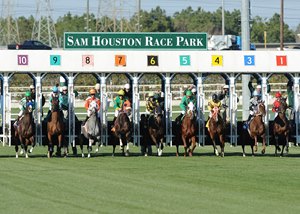HISA, Texas Clashing Over Regulatory Lines


When the first phase of the Horseracing Integrity and Safety Act goes into effect July 1, the Texas Racing Commission asserts the statutory framework allowing for legal pari-mutuel wagering in the Lone Star State will cease to exist and that wagering on live and simulcast races will stop.
According to Lisa Lazarus, CEO of the Horseracing Integrity and Safety Authority, which is charged with implementing the law that creates federal oversight of medication testing and enforcement along with other track safety rules, no such dire circumstances exist for Texas or any other racing state.
This exchange, shared recently in letters between Lazarus and Amy F. Cook, executive director of the Texas Racing Commission, shows how much the lines of authority still need to be worked out between state commissions and the ultimate goal of achieving uniform national regulation for horse racing.
Cook's May 20 letter to Lazarus followed earlier communications with the Federal Trade Commission as part of the public commenting solicited as HISA drafts its rules, and an announcement in February that the Texas Racing Commission joined a lawsuit challenging the constitutionality of the federal law.

Cook said May 24 during an interview on Steve Byk's At the Races radio program she sent the letter to Lazarus to get clarity and avoid "regulatory chaos."
The letter asks Lazarus to provide the specific dates, races, and horses that HISA intends to regulate starting July 1 within the state. Cook also states that under the Texas Racing Act, no pari-mutuel wagering on live or simulcast races is permitted on races the state commission does not supervise, so under HISA it expects wagering will not be allowed "on those dates which the Authority asserts jurisdiction." The letter further asks that HISA be advised to have all its personnel comply with Texas Racing Commission license requirements.
"If you do not notify me of your future intentions, the agency will assume the Authority does not intend to assert jurisdiction and to regulate scheduled Texas 'covered horseraces' pursuant to the Horseracing Integrity and Safety Act (the Act)," Cook's letter concluded. "This letter is written because of the uncertainty created by your lack of communication, which impairs the ability of the Texas Racing Commission as well as racetrack associations to plan their races."
Cook also offered another invitation to Lazarus to come to Texas and visit the commission team to "understand our perspective."
Lazarus responded to Cook in a Tuesday letter that, among several issues noted, the predicted imminent shutdown of pari-mutuel wagering in Texas did not exist because of HISA.
"As has been the case with every other state racing commission, we have made numerous attempts to engage with the Texas Racing Commission on the Authority's implementation of HISA rules and stand ready to work with you to ensure that Thoroughbred racing flourishes in Texas and across this country," Lazarus wrote. "Your letter appears to take the position that if the Authority acts as Congress directed, the Texas Racing Commission may effectively shut down Thoroughbred racing in Texas. If this is correct, it is unfortunate and unnecessary. It is hard to imagine that Texas takes the same approach to other regulatory areas where the federal government exercises concurrent or limited jurisdiction."

According to Lazarus, the federal law does not modify or restrict any general law or regulations adopted by states as related to criminal conduct, animal cruelty, matters related to anti-doping, medication control, or racetrack safety in covered races and covered horses. HISA rules that are promulgated, however, shall preempt any provision of state as it pertains to matters within the jurisdiction of HISA.
She added that any Thoroughbred race in Texas that is exported as a pari-mutuel signal will be governed by HISA rules. Should Texas choose not to conduct Thoroughbred races and export them for simulcast wagering, then there would be no "covered horses" in Texas to which HISA rules would apply.
During her interview with Byk, Cook said how HISA rules will apply to the variety of horse racing in Texas contributes to the regulatory chaos she sees coming.
"Who is regulating our mixed meets? We may have Arabians and Paints one night and the next night Quarter Horses only. You have regulatory chaos created by which horses, which events. That isn't answered," Cook said.
Cook also said while she knows letters of agreement and cost estimates will arrive soon from HISA that Texas law does not allow the Texas Racing Commission to "opt in" to these types of agreements.
"Unfortunately, the law as designed, the methodology it employs are not effective and the unintended consequences are what will happen," she said.
Rather than force these agreements through, Cook said she is advocating for a grant-type program between HISA and the state commission that mirrors how the National Guard operates with the federal government. When the National Guard is called, the federal government typically covers 75% of the cost and the state affected covers 25%.
"The FTC could become a granting agency," she said. "The state racing commissions are under-resourced but all want to achieve uniform standards. We could apply for these matching programs and then the state commissions can do the business they have been doing for over 125 years."
Lazarus did address in her response to Cook that HISA is finding ways to effectively work with state commissions.
"We do appreciate that the particularities of each state must be accounted for in the Authority's implementation of the Act. In fact, the Authority is currently working cooperatively with multiple states to ensure implementation of federal law under their specific regulatory and governance structure, and I am optimistic we could do the same for Texas," Lazarus wrote.
"HISA and the Texas Racing Commission share common goals: to make horse racing safer and fairer for all participants," Lazarus' letter concludes. "If you would engage with us, I am confident we could reach a solution so that together we can reach these goals in a manner that preserves the important role of your Commission while acting in compliance with federal law."
